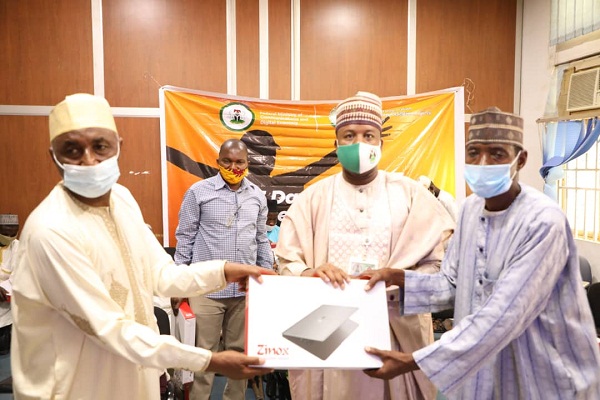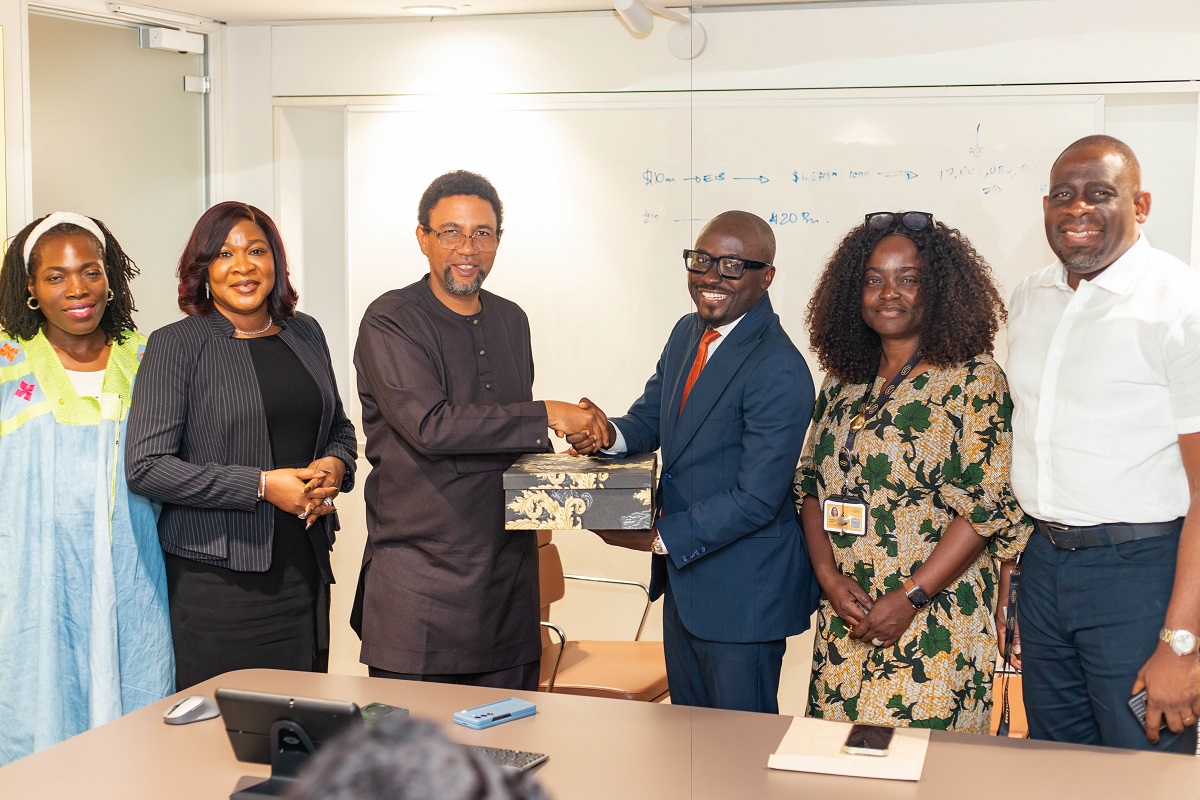Telecom
NITDA Empowers PLWD in Kano with Digital Skill

As part of effort to make digital literacy all inclusive, the National Information Technology Development Agency, NITDA on Friday completed the training for 30 persons living with various forms of disabilities,PLWD in Kano, Kano State.
The closing ceremony of the five-day training on Office Automation and Technoprenuership was virtually attended by the Executive Governor of Kano State, His Excellency, Dr Abdullahi Umar Ganduje who was represented by Mallam Salihu Tanko Yakasai, senior special assistance on Media, the Honourable Minister of Communications and Digital Economy, Dr Isa Ali Ibrahim Pantami, and the NITDA Director General, Mallam Kashifu Inuwa Abdullahi.
The Minister, in his remarks as the Chief Host advised the trainees to be ambitious and not to see their disabilities as challenges that would not make them achieve success in their chosen endeavours.

“You have to build on the skills you have acquired, challenge your previous successes,” he advised.
He said that, “as entrepreneurs, you will face a lot of challenges so encouraged to be focused and chase your passion diligently”, adding that no deformity can limit the level of achievements except the one set for yourselves.
Citing example of some renowned tech guru in the world, the minister explained that most of them turn their challenges to strength so they could become what they are today.
He said, “Jeff Bezos founded Amazon in his garage in the year 1994 without making a profit for years. So you don’t have to be discouraged but keep your eyes on the ball”
Dr Pantami informed the beneficiaries to count themselves lucky for being selected out of many people that applied for the training advising them to make judiciously used of the working tools provided for them and not to be tempted to sale it.
The minister while commending the NITDA boss and the entire management of the Agency for strategically implementing the policy of the ministry stated that the ministry would continuously coming up with strategies that will support the digital economy mandate of the ministry.
He directed NITDA to continue giving high premium to developing the capacity of the people. “I want you to keep this training going so our people can be empowered. You are also advised to have data base of the beneficiaries in order to keep monitoring their achievements.
In his remarks, the representative of the governor, Mallam Yakasai commended NITDA for choosing Kano state for the training, noting that the acquired skills by the trainees would assist them to be self-reliant.

He said the state government would remain grateful for the opportunity. While maintaining that the state government is also striving to ensure that the lives of the physically challenged are supported with initiatives that would make things easier for them.
Earlier in his speech, the NITDA boss said that the programme is targeted at promoting inclusiveness in the nation’s journey to digital economy.
He added that the outbreak of COVID-19 pandemic has made digital skills imperative.
He said, “never before was digital skills more critical as it is today. As we move from pandemic emergence response phase to recovery phase, the unprecedented disruption of this pandemic is accelerating the urgency of digital transformation and it has forced us to embrace new practices such as social distancing, remote working and virtual events.”
He reiterated that the training is aimed at ensuring that no Nigerian is left behind in the journey to digital Nigeria.
“The Honourable Minister has enjoined us to embark on massive training and re-skilling for all Nigerians including more than the 25 million people living with disabilities”.
He added that this year training is focused on upskill and empowerment of the people living with disabilities with digital skills on Office Automation and Technoprenuership.
He said special attention is being paid to entrepreneurship because Small and Medium Enterprise and tech startups are the backbone of any nation.

Ado Sanusi Sabongida, one of the beneficiaries of the training who is living with Cerebral Palsy, delivered vote of thanks on behalf of the others. He thanked the management of the NITDA for not forgetting special people in their programmes.
He equally advised other agencies of government to emulate NITDA at empowering the special people adding that they should be looking inward to see abilities in their disabilities.
The highlight of the ceremony was the presentation of working tools to the trainees.
Telecom
Bolt’s Playtivism Campaign Brings Chess Park to Lagos

Bolt, the leading ride-hailing platform in Africa, is reimagining what urban spaces can be with the launch of its “Playtivism” campaign in Lagos.

As part of this global initiative, Bolt is transforming a traditional parking lot into a “Chess Park”, a vibrant, people-first space where Lagosians of all ages can gather, play chess, and foster stronger community ties.
Playtivism is a call to playful, people-centered urban design. It is about giving cities back to the people by repurposing car-dominated spaces into areas that promote health, connection, and joy.
The campaign is inspired by over 81,000 submissions received during Bolt’s Rewind2023 campaign, where users shared ideas on how to make cities more liveable.
In Lagos, this vision takes shape through the Chess Park activation at Ikeja City Mall, taking place from April 9 to 13, a unique urban intervention that prioritizes people over cars.
The initiative is aimed at creating a new kind of meeting point, one where elders and youth can connect over chess, building bridges across generations and sparking meaningful community engagement.
The park will feature daily “teach-and-play” sessions hosted by two professional chess experts, as well as exciting activities including cash prizes for participants and other classic games like Ludo and more, open to anyone interested in learning or improving their skills.
As part of the activation, the renowned non-profit organization Chess In Slums will be participating on April 11, further reinforcing the park’s mission to empower and unite through play.
This initiative is part of a broader global effort, with a similar Urban Playground activation that was run in Lisbon, all under the Playtivism umbrella.
Bolt is turning the idea of mobility into more than just movement, it’s about rethinking how we use our shared spaces.
Speaking on the initiative, Osi Oguah, General Manager for Bolt Nigeria said: “At Bolt, we believe that cities become more fun, inclusive, and healthy when we design them for people, not just for cars and through Playtivism, we’re showing that small changes like turning a parking lot into a chess park can have a big impact on how communities interact and thrive.
“And next time you need to drive somewhere, think about riding instead. It’s better for your wallet, and better for your city. Riding is the new driving”, Osi said.
Telecom
MTN Extends Application Deadline for Media Innovation Programme to April 12

In a welcome turn of events for journalists, broadcasters, and content creators across the country, MTN Nigeria has announced the extension of the application deadline for its highly coveted Media Innovation Programme (MIP) to April 12, 2025. Originally slated to close on April 7, 2025, the new deadline provides additional time for a wave of aspiring applicants eager to join the next generation of media changemakers.

Now in its fourth year, the MTN Media Innovation Programme, run in partnership with the School of Media and Communication, Pan-Atlantic University (PAU) has become a career-defining fellowship for Nigerian media professionals. It offers a six-month, fully-funded certificate program packed with on-site training, international exposure, digital storytelling masterclasses, and access to a powerful alumni network.
According to MTN Nigeria and the School of Media and Communication, Pan-Atlantic University, the deadline extension is a response to the increasing volume of last-minute applications and growing demand for more inclusive access across the country.
“We’ve seen a remarkable surge in interest from content creators and journalists outside major urban hubs,” said Tobe Okigbo, Chief Corporate Services & Sustainability Officer, MTN Nigeria. After the webinar on April 4 hosted by past MIP fellows to support the applicants, it was important to extend the deadline to enable more diverse voices have a chance to be part of this experience”, he added.
In a rapidly shifting media landscape, where traditional models are being upended by digital disruption, programs like MIP are filling a critical gap, equipping media professionals with the tools to adapt, innovate, and lead.
With Nigeria’s entertainment and media industry projected to grow from $9 billion in 2023 to $13.6 billion by 2028, MTN’s initiative could not be more timely.
And for those still sitting on the fence. A recently hosted webinar featuring past fellows, including prominent voices like Mike Okwoche, a seasoned broadcast veteran and media mentor, and Amaka Okoye, a journalist and correspondent with experience in international media projects and digital transformation, offered inspiring testimonies about how MIP reshaped their professional outlook and positioned them at the forefront of media innovation.
The new application deadline, April 12, 2025, offers a lifeline for media professionals who might have missed the initial window. But make no mistake: the clock is ticking. And for those with big ideas and bold stories to tell, this is the time to apply.
Interested journalists, bloggers, and content creators can apply for the MIP 2025 at https://bit.ly/MTN_MIP2025.
Telecom
GSMA Reveals Sub-Saharan Africa as Mobile Money Epicentre

Mobile money has surpassed two billion registered accounts, with over half a billion active monthly users across the globe in the 25 years since its launch.

Leading this market growth is Sub-Saharan Africa with a total of 1.1 billion registered accounts and more than 280 million active 30-day accounts, as recorded at the end of 2024.
This is based on the State of the Industry Report on Mobile Money 2025, compiled by the GSM Association’s (GSMA’s) mobile money programme data and insights team.
Now in its 13th year, the report details the progress of mobile money, with the latest edition indicating transaction volumes and values for mobile money accounts experienced double-digit growth in 2024.
Over 108 billion transactions worth $1.68 trillion were processed through mobile money accounts, for the period under review. This is equivalent to $3.2 million worth of transactions per minute, says Vivek Badrinath, GSMA director-general.
Year-on-year, transaction volumes increased by 20%, while transaction values grew by 16%, up from a 13% increase in 2023.
According to the report, the industry took 18 years to achieve one billion registered accounts and 250 million active users from 2001, doubling in size in the following five years.
Mobile money accounts have “consistently” maintained growth rates above 10% since 2020. In 2024, registered accounts increased by 14% year-on-year to 2.1 billion, while active 30-day accounts grew by 11% to reach 514 million, the report reveals.
Badrinath highlights that Sub-Saharan Africa remains the epicentre of mobile money, accounting for most new registered and active accounts.
“Mobile money has emerged as a powerful driver of financial inclusion and economic growth. Its continued success depends on supportive regulatory environments that promote innovation and accessibility, and help unlock the full socio-economic potential.
“To ensure mobile money remains accessible, affordable and safe, it is vital for governments and regulators to work with financial service providers to support financial literacy programmes, empowering underserved populations and opening new opportunities for financial decision-making.
“Looking ahead, I believe we are well-positioned for the next wave of expansion, where mobile money emerges as the preferred payment service, driving business growth, strengthening economies and shaping a better future for all.”
The report also notes that mobile money continues to play a key role in economic development. By the end of 2023, the total gross domestic product (GDP) of countries with mobile money services was over $720 billion higher than it would have been without them, reflecting a 1.7% increase in GDP driven by mobile money.
“In Sub-Saharan Africa alone, year-on-year, mobile money added around $190 billion to GDP in 2023, demonstrating its sustained economic influence.”
Regional phenomenon
Mobile money is used to buy goods and services, save money and send money to friends and family – both at home and abroad.
Based on the report, the bulk of mobile money accounts in the Sub-Saharan Africa region was driven by adoption and use in East and West Africa.
East Africa was the leading driver of monthly active account growth in 2024, followed by Southeast Asia and West Africa.
Introduced as an offering for financial inclusion for the unbanked, mobile money offerings, such as East Africa’s M-Pesa, have become the region’s most popular mobile money platform.
According to the report, over two-thirds of registered accounts in 2024 came from Sub-Saharan Africa. In 2024, there were more than one billion registered accounts in Sub-Saharan Africa – twice as many as in 2020.
Compared to forecasts from 2019, the GSMA found that registered accounts grew faster than expected, with data from 2024 showing 75% more registered accounts in Sub-Saharan Africa than estimated.
“Growth in active 30-day accounts was driven by East Africa, which contributed 32% of new accounts in 2024, closely followed by Southeast Asia (28%). West Africa and South Asia contributed 21% and 19%, respectively. Double-digit growth in active monthly accounts in 2024 confirmed that millions continue to rely on mobile money for their daily financial needs.
“Between 2014 and 2024, the number of active 90-day accounts as a proportion of SIM cards in Sub-Saharan Africa rose from 10% to 39%. Across other regions, the highest ratio of active 90-day accounts to SIM cards was 8% in South Asia. While some countries in Sub-Saharan Africa can be considered relatively mature, there is still room for growth – both in Sub-Saharan Africa and in other regions.”
Southeast Asia recorded the second-fastest growth rate for active monthly accounts, behind the Middle East and North Africa.
“The region saw active 30-day accounts grow faster than registered accounts, supported by enabling regulatory environments in markets including Cambodia, Fiji, the Philippines and Vietnam.”
The GSMA also reveals that in East Asia and the Pacific many mobile money providers have evolved into full-service financial platforms, offering a broad range of products to match user needs. The most successful providers are often those who are actively innovating the breadth of their offerings, it says.
“Mobile money providers are increasingly offering adjacent financial services like credit, savings and insurance. As of June 2024, 44% of providers offered credit services, making it the most used adjacent financial product. Savings services were offered by around a third of providers, while insurance remains the least common with around 28% of providers offering it.”
Despite progress, the report highlights that several barriers to adoption remain, notably among women. It states that among 12 countries surveyed, eight continue to exhibit a gender gap in mobile money ownership, with little improvement since 2023.
“Limited awareness and low digital financial literacy are significant barriers, particularly for women. However, women who hold mobile money accounts are nearly as likely as men to have used them in the past 30 days.”
Badrinath states: “As we continue our work to close the usage gap, and drive digital and financial inclusion, it is hugely encouraging that almost 60% of mobile money providers have introduced digital skills initiatives. These efforts not only boost financial awareness and combat fraud, they also help to break down the barriers that prevent millions – especially women – from fully benefitting from mobile money services.”

 E-Financial3 days ago
E-Financial3 days agoAfDB Mobilizes $2.2Bn to Support Nigeria’s Agriculture

 News3 days ago
News3 days agoMTN Pens Moving Tribute to Pascal Gabriel Dozie, Former Chairman

 General News3 days ago
General News3 days agoNIPOST Threatens Courier, Logistics Service Providers

 E-Business3 days ago
E-Business3 days agoNatasha: TMG Demands Probe of Alleged Data Breach in Failed Recall

 Broadcasting2 days ago
Broadcasting2 days agoStarlink, DStv, Others Pay “Peanuts” to Operate in Nigeria- Minister

 E-Business3 days ago
E-Business3 days agoCJN Warns Judicial Officials against Data Breaches, Cyber Attacks

 Telecom3 days ago
Telecom3 days agoNCC Issues 90 Days Deadline to Telcos to Resolve Subscribers’ Unclaimed Airtime

 E-Financial2 days ago
E-Financial2 days agoNigeria to Exit Grey List Soon – SEC



























